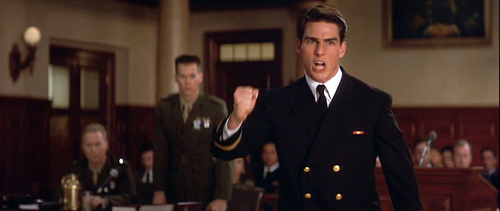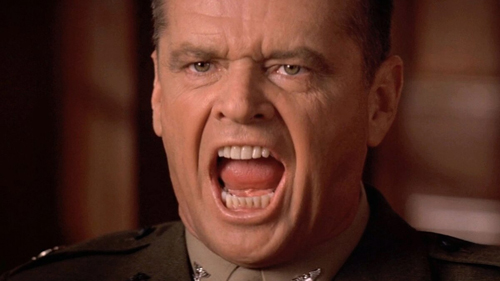
Your complimentary articles
You’ve read two of your four complimentary articles for this month.
You can read four articles free per month. To have complete access to the thousands of philosophy articles on this site, please
Films
A Few Good Men
Matt Qvortrup casts Tom Cruise as a Kantian and Jack Nicholson as a utilitarian in this Cold War courtroom ethics epic.
“You can’t handle the truth!” Jack Nicholson’s outburst in one of the final scenes of Rob Reiner’s A Few Good Men (1992) might imply to a philosopher that this film is about epistemology – how we understand the world – or about metaphysics – the nature of reality. But the truth is very far from it. In fact, this drama about the extrajudicial killing at the Guantanamo Bay Naval Base of Willy Santiago, an underperforming and disobedient soldier of private rank, is above all about ethics. More precisely, it’s a showdown between utilitarian (or consequentialist) ethics and its Kantian (or deontological) counterpart.
Rob Reiner, who had previously directed the funny but hardly philosophical When Harry Met Sally (1989), is not a filmmaker usually associated with metaethics, the comparison of ethical theories. Nor is Aaron Sorkin, the scriptwriter, particularly known for his deep knowledge of the finer points of moral philosophy (although he did later go on to write The Social Network, a film about the legal issues surrounding the founding of Facebook, for which he won an Oscar for best adopted screenplay). Yet A Few Good Men is a filmic exposition of the deepest ethical questions that have been posed by philosophers, from Aristotle’s Nicomachean Ethics around 350 BC to John Rawls’ A Theory of Justice in 1971; and though it is never articulated explicitly, the film is the scene for a showdown between arch ethicists Immanuel Kant and Jeremy Bentham. The conflict in this movie is a battle between utilitarian ethics, which assumes that the end justifies the means, and the Kantian belief that we must always represent the rights of the individuals.

“It’s my moral duty to thump this table with my fist!”
Images © Columbia Pictures 1992
Some Utilitarian Information
A few preliminaries might help. First a reminder of the fundamental points of utilitarianism. In its most recognisable form, utilitarianism can be traced back to the English philosopher Jeremy Bentham (1748-1832), who is often associated with the ‘greatest happiness principle’. This is the idea that the right action in any situation of moral choice is the one that creates or enables ‘the greatest happiness of the great est number of people’. The phrase was not coined by him, as Bentham was the first to admit. The father of utilitarianism first read it in the library in Queen’s College, Oxford, and the source he gave for it was the chemist-cum-philosopher and religious dissenter Joseph Priestley (1733-1804). That Midlands-based polymath was famed as the man who invented soda water; but in his day he was also a political writer of renown. Priestley used ‘the greatest happiness principle’ in his Essay on Government of 1768. (This story is told by Mary Warnock in her Introduction to John Stuart Mill’s Utilitarianism.)
Bentham was a decent and honourable chap. He duly acknowledged his indebtedness to Priestley. But, in fact, the principle was older still. Historians of intellectual thought will rightly point out that the ‘greatest happiness principle’ was first used by the great German philosopher Gottfried Wilhelm Leibniz (1746-1716) in a critical remark on the relatively unknown legal reformer and jurist Samuel Cocceji (see for example, ‘The Greatest Happiness Principle and Other Early German Anticipations of Utilitarian Theory’, Joachim Hruschka, Utilitas, p.166, 1991). But the principle is now associated with Bentham, above all because he was a better self-publicist.
It is another curious fact that the phrase which became a shorthand and an article of faith for Benthamite utilitarian moral theory started its life as a footnote in the 1822 edition of Bentham’s Introduction to the Principles of Morals and Legislation. Here he wrote that a theory of ethics and political philosophy should be based upon, “a principle which lays down, as the only right and justifiable end of Government, the greatest happiness of the greatest number” (p.7).
For Bentham, ethics was a practical discipline, one that should be purged of theological references and ideas of ‘natural rights’, the latter Bentham denounced as ‘nonsense on stilts’.
All these ideas can be found in Rob Reiner’s film.

“It’s for the greatest good of the greatest number that I shout a lot!”
In Defence of Duty
Santiago’s death takes place within the first five minutes of the film, and the rest is a courtroom drama. Without spoilers, it can safely be said that Jack Nicholson’s character throughout the film defends Bentham’s principle while defending the accused soldiers. Colonel Jessup has only distain for those who defend abstract moral principles, and even the rule of law: what matters is the end result. This means that on occasion, if it serves the purpose of protecting ‘the greatest number’ of people, a ‘code red’ – military slang for extrajudicial punishment – is justified. Basically, the end justifies the means; or as Søren Kierkegaard put it (in a surprisingly consequentialist remark), there is a ‘teleological suspension of the ethical’ (Fear and Trembling, 1843). The difference is only that the Jack Nicholson character expresses himself in less lofty terms than the Danish existentialist. When confronted with ethical criticism, he is forceful: “I don't give a shit. We're in the business of saving lives”. Moreover, because of his pragmatism, Colonel Jessop has “neither the time nor the inclination to explain myself to a man who rises and sleeps under the blanket of the very freedom that I provide and then questions the manner in which I provide it.” That man is Tom Cruise.
Colonel Jessop is confronted by Tom Cruise in the guise of Lt. Daniel Kaffee. A Harvard graduate and son of a former attorney general, Kaffee is spending a couple of years as a defence lawyer for the military before he can begin (so we are led to believe) a lucrative career as a lawyer. Initially portrayed as a brat who is more interested in baseball than jurisprudence, Cruise’s character, in contrast to Nicholson’s, fundamentally holds to the deontological belief that there are ethical standards that cannot be violated. The word ‘deontological’ comes from the Greek ‘deon’ – that ‘which ought to be done’, or simply, ‘duty’. Whether the death of a soldier as a result of a ‘code red’ saves the lives of the many is not the important matter to Kaffee, as it is to Jessop. What matters is that there is right and there is wrong, and the right is what ought to be done. Here the motive, not the outcome, is of paramount moral importance.
In holding this view Lt. Daniel Kaffee is a Kantian. For Kantians, the consequences of an action are not unimportant, but for an action to be good, it has to be consistent with ‘the good will’, in other words, the motive behind it has to be good. And according to Immanuel Kant (1724-1804) and other deontological ethicists, to follow the command of ‘the moral law’ is a categorical imperative – meaning, the moral law ought to be followed whatever the circumstances. But what is this moral law? In his Groundwork of the Metaphysics of Morals (1785), Kant argued that you should always “act in such a way that you treat humanity, in your own person as well as in the person of any other, always at the same time as an end, never merely as a means.” What the soldiers at Guantanamo Bay ought to have done, then, to act ethically, is to have treated each other as ‘ends in themselves’, not as mere means. To order a Code Red was to make an example of Private Santiego for the purpose of bolstering military discipline. As such it was treating him, merely as a means, not as an end-in-himself.
The Ethics of Power
In the history of political philosophy there has been no shortage of writers to attack Kant’s position. Writers of the so-called ‘Realist’ school – who rejected the idealism espoused by Kant in On the Perpetual Peace (1795) – argued that the moral idealism embraced by deontological philosophers will in the end lead to more hardship. As the doyen of this school, Hans Morgenthau (1904-1980) wrote, “While our hand carries the good intent to what seems to be its consummation, the fruit of evil grows from the seed of noble thought” (Scientific Man vs. Power Politics, p.188, 1946). Perhaps Colonel Jessop learned about Realism and read Morgenthau while at West Point. The film certainly makes it seem that way. The Colonel’s ideas bear a striking resemblance to the philosophy of Morgenthau, as well as to the utilitarianism of Jeremy Bentham. Upon retorting “You can’t handle the truth!” to Tom Cruise’s Kantian questioning, Nicholson’s character neatly sums up utilitarian and consequentialist ethics. His tirade deserves to be quoted verbatim:
“Son, we live in a world that has walls, and those walls have to be guarded by men with guns. Who’s gonna do it? You? You, Lieutenant Weinberg? I have a greater responsibility than you can possibly fathom. You weep for Santiago, and you curse the Marines. You have that luxury. You have the luxury of not knowing what I know – that Santiago’s death, while tragic, probably saved lives; and my existence, while grotesque and incomprehensible to you, saves lives.”
Poor Santiago’s death ‘saved lives’. There we have it: the greatest happiness for the greatest number of people.
A Few Concluding Remarks
Of course, A Few Good Men is not just an exposition of two diametrically opposed positions in moral philosophy and a prolegomenon (preparation) to a discussion of what good and bad are. It’s a gripping story of life and death performed by actors at the height of their powers. There is an exuberant playfulness in the direction (including the casting of the screenwriter Aaron Sorkin in a cameo role as a trial lawyer). The film has a dazzling cast of aspiring actors on the cusp of superstardom: Demi Moore is superb in her role as the junior counsel Lieutenant Commander Joanne Galloway. These days, if you’re English, Kevin Bacon is best known for phone advertisements; but his performance here as the prosecuting lawyer is no less than excellent. And whatever one thinks of Tom Cruise’s much publicised religious views, this film should silence all his critics about his acting. But it is Jack Nicholson who stands above all. Those who read Sorkin’s screenplay will find Colonel Jessup somewhat one-dimensional, and a downright unpleasant Cold Warrior. In the film, though, Nicholson speaks with passion and conviction. Uncomfortable though it is, the viewer may find it hard to disagree with his consequentialist moral philosophy. To those who live comfortable lives and who pontificate about human rights, Colonel Jessup has a simple response: “You don’t want the truth because deep down in places you don’t talk about at parties, you want me on that wall. You need me on that wall.” And to those who still dissent, he says, “I suggest you pick up a weapon and stand a post.” For a Kantian, his ideas are deeply troubling; but they are hard to refute.
© Dr Matt Qvortrup 2020
Matt Qvortrup is Professor of Political Science at Coventry University.









